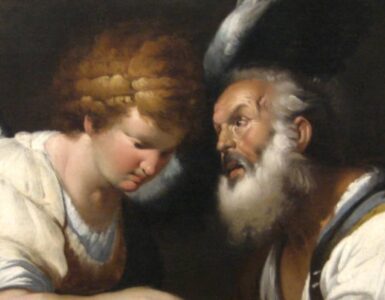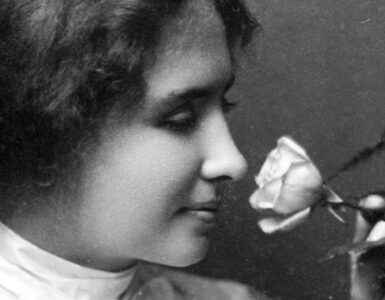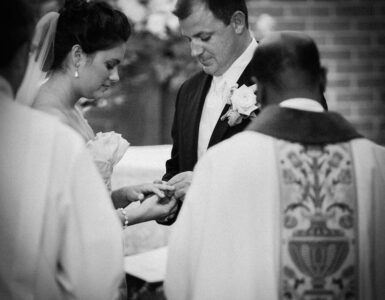A young man in his late twenties told his pastor, “Father, I’ve started looking for another place to work.” “Really?” said the priest. “I thought you were happy with your position.” The young man explained, “Well, I was, but then something happened yesterday that made me reevaluate my goals. My boss came into the office all excited, walked right over to me, and boasted, ‘You won’t believe what I bought yesterday—you’ll be green with envy.’ Then he showed me a picture of his new luxury car, a Lexus, and he said, ‘Eat your heart out—that’s what I’ll be driving from now on.’ I stood there stunned, thinking my boss was so immature and foolish to tie his happiness and purpose in life to a new car—and then, to make things worse, he told me, ‘Kid, if you keep your nose to the grindstone, one day you can be like me.’ Father, those words have been haunting me, and I asked myself, ‘Do I want to be like him—ransoming my happiness to the passing values of this world?’ That was an awakening for me, a moment when everything came into focus—and so I’m getting out of this job, and asking God to help me find something where I can make a difference by helping people, something I’ll be able to look back on without regret when I’m on my deathbed” (William J. Bausch, Once Upon A Gospel, pp. 43-44, paraphrased). We might reasonably assume the priest praised the young man for his wisdom and maturity, and promised to pray that God would help him discover his true calling in life.
The values and attractions of this world sometimes seem to make sense—after all, the young man’s boss was successful and very excited that morning. However, this so-called “success” makes sense only in a shallow, temporary, and ultimately unsatisfying way. God created each of us for something far greater than money, material possessions, and worldly achievement. You and I are destined for eternal glory—but this destiny can be fulfilled only if we’re willing to put God first, to make whatever sacrifices are necessary in order to be faithful to Him, and to take up our cross each day and follow after Jesus.
In his Letter to the Romans (12:1-2), St. Paul urges us not to conform ourselves to the present age, but to let our minds be renewed and transformed by God’s grace—for this will allow us to discern God’s will, and to discover what leads to true and lasting goodness and spiritual perfection. St. Peter had to learn this lesson the hard way. When, in the Gospel of Matthew (16:21-27), Jesus described how His mission involved rejection, suffering, and death, Peter tried to talk Him out of it. Our Lord immediately and decisively rebuked him, even to the point of implying the apostle was being manipulated by Satan. Then Jesus emphasized that we must choose between the passing values of this world, and the eternal values of the Kingdom of Heaven. It’s impossible to live by both simultaneously, and those who try to do so are in danger of losing their souls. Instead of foolishly living for ourselves, we must lose our lives for Christ’s sake—in the sense of putting His will ahead of our own, trying to do what’s right even when it’s not easy, and trusting that, in all things, God truly knows best.
Two friends, Bill and Leroy, grew up in a small town, but then Leroy moved to New York City. When Bill went to visit him, Leroy showed him his apartment, and said, “What I like about living in New York is the freedom—unlike the small town where you still live. It was cramping my style, but here I’m not bound by anyone’s expectations; I can live the lifestyle I choose, eat where and what I want, dress the way I want, and do what I want— perfect freedom!” Then, as they were about to leave the apartment to go sight-seeing, Leroy locked the door, turned the dead bolt, and switched on the alarm, and then warned Bill, “Don’t dare open that door without switching off the alarm, or all hell will break loose and the cops will come and arrest you!” (William J. Bausch, Storytelling the Word, p. 127, paraphrased).
Jesus tells us that if we live only for ourselves, we risk losing everything. To this, we might also ask ourselves: if we live in fear, are we truly free?
This is an important theme in Archbishop Vigneron’s pastoral letter Unleash the Gospel. In the letter, the Archbishop frankly discusses many of the challenges facing the Archdiocese of Detroit, and indeed, all of southeast Michigan: widespread poverty, years of stagnant economic growth, difficulties in diversifying from the auto industry, lingering effects of racism, a pervasive mentality of “us vs. them” in terms of Detroit and the suburbs, and in regard to the local Church, a growing shortage of priests, a worrying rise in the average age of the clergy, the painful necessity of closing many parishes and schools over the last few decades, the damage to the Church’s reputation caused by the sexual abuse scandal, and the overall indifference or outright hostility to the Gospel on the part of so many people in our increasingly secularized society. It would be tempting for our local Church to adopt a siege mentality and withdraw into our parishes and schools and institutions, to limit ourselves to those forms of ministry that are familiar and comfortable, and to focus on merely maintaining what we have while hoping for the best. However, the Archbishop insists, this is not the way of Christ, and not the way of the Gospel; we are called to live out our faith boldly and joyfully—thereby taking up our cross as an entire Archdiocese, and, in the Archbishop’s words, “helping change our cultural DNA.”
What exactly does this mean—for us as individual Catholics? How are you and I supposed to play our part in helping “unleash the Gospel?” It means that Jesus does not want us to settle for the values of this world, nor be afraid of putting our faith into practice in a wholehearted and committed way. He promises that if we entrust our lives into His hands, we will find the path that leads to true freedom, happiness, and eternal life.





























